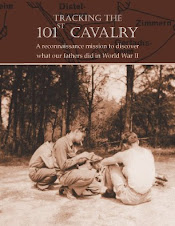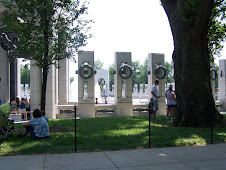 On Sunday, April 29, 1945, the 101st Cavalry came across a prisoner of war camp in Murnau, close to the Austrian border. Most of those imprisoned there were Polish officers. While seeking information about the 101st, I also learned more about the men in that camp. Here is the story of one of those men in the words of his sons.
On Sunday, April 29, 1945, the 101st Cavalry came across a prisoner of war camp in Murnau, close to the Austrian border. Most of those imprisoned there were Polish officers. While seeking information about the 101st, I also learned more about the men in that camp. Here is the story of one of those men in the words of his sons. Photo: Seweryn Majcherkiewicz. Born December 29, 1910, he was about 30 years old when this photo was taken.
Prepared by Przemo and Stan Majcherkiewicz
We are the children of 2nd Lt. Seweryn Majcherkiewicz, an officer who fought in WWII defending Fort Modlin at the outskirts of Warsaw, Poland, during the German Blitzkrieg campaign in the fall of 1939.
We grew up in a special period of Polish history: a time when it was forbidden to even talk about things like slaughter of Polish officers and intelligentsia in the forests of Katyn in 1940 by the Soviets; the May 3rd Constitution of 1791, only the second such document passed by any nation following the American Constitution, an attempt to rejuvenate Poland against her Russian and German enemies; and the June 1956 unrest in Poznan against Soviet oppression - some of the most important events related to the long history of Poland’s struggle for Her freedom and independence.
This was also a time when a simple and obvious thing like listening to the Voice of America and Radio Free Europe radio stations was strictly forbidden. This was the 1950s and ’60s - the apogee of the Soviet domination in Poland.
Maybe that is why our father was hesitant in sharing his war and camp memories with us, his children.
Or maybe he just simply wanted to forget about those hard times.
What we only knew then was that during the defense of Modlin he was wounded in the head with pieces of shrapnel. That, later on, after the capitulation of Warsaw, he was transported by train along with many, many other officers to the Bavarian town of Murnau, near Munich in Germany, to the Oflag VIIA POW camp for Polish officers. That he worked there in camp’s post office, and that he was involved in some sort of underground movement within the camp.
We were very proud of our father, because he was so brave and because he fought for the freedom of our beloved Poland.
Our father’s two sisters Jozefa and Jadwiga were also not too talkative on his Murnau episode. After the war, when the three of them were together and the topic of Murnau or WWII came up, they would switch languages and started speaking German. We thought this was to not let us know too much, so we would not face any trouble from the communist authorities. During WWII, both of these sisters were taken away by Germans and forced to work somewhere in the Rhine-Westphalia area (provinces of Germany). They would only say that they wrote their brother frequently, that they would send him some parcels with food and other life necessities, and that they had visited him a couple of times in Murnau.
Our father never showed us too many keepsakes he (supposedly) had from these times. But we remember several of them: his uniform, a leather belt and his officer side bag, a hat, a cigarette box and a carved statue in his likeness, just 4 inches tall (100mm) - both carved in wood in the camp by some talented friend. But we never saw any documents or pictures from his “encounter” with Murnau.
In the 1970s, our father took part several times in reunions of the POWs that took place in Miechow, Poland, where an elementary school was built. It was partially funded by this POW group. The school was later named after them.
And this was it. We knew not much more. Our father did not talk and we did not ask.
Only later we started learning more about Murnau. In 1970 a book Za drutami Murnau (Behind the barbwires of Murnau) by Stefan Majchrowski was published. Our father’s name is mentioned in there. Then several years later, in 1977, our father’s good friend 2nd Lt. Jozef Hubert published his own book Odwrocone losy (Reversed Fates), in which he widely writes about our father, too.
After our father’s death, as the years went by, we kept finding some of his documents here and there among other house things during seasonal cleanings. That’s how we found his military ID card as well as letters and other documents. That’s also when one of us - Przemo, his younger son - came up with the idea of going to Murnau to see this place. Years had come and passed by and finally in 2007 Przemo had the chance to fulfill his dream, although not fully. Unfortunately on this July Sunday afternoon he was not let in to what is now Bundeswehr (German army) living quarters and what used to be called Oflag VIIA - the place where our father spent six years of his life.





10 comments:
Hi there, I just came across your blog and read your entry with interest. My father, George (Jerzy) Dlugopolski was also a prisoner in Murnau through the war years. He is gone now, but I remember him telling me that he was experimented upon by the Nazis doing hypothermia experiments. He said that he was put in a vat of freezing water and then in hot water. This is all he mentioned and very rarely talked about it. I have since read of other such similar experiments in other camps, but could find no information of this going on at Murnau. Would you have any information on this?
Thanks,
Inka Glick
Hi there, I just came across your blog and read your entry with interest. My father, George (Jerzy) Dlugopolski was also a prisoner in Murnau through the war years. He is gone now, but I remember him telling me that he was experimented upon by the Nazis doing hypothermia experiments. He said that he was put in a vat of freezing water and then in hot water. This is all he mentioned and very rarely talked about it. I have since read of other such similar experiments in other camps, but could find no information of this going on at Murnau. Would you have any information on this?
Thanks,
Inka Glick
Hi there, I just came across your blog and read your entry with interest. My father, George (Jerzy) Dlugopolski was also a prisoner in Murnau through the war years. He is gone now, but I remember him telling me that he was experimented upon by the Nazis doing hypothermia experiments. He said that he was put in a vat of freezing water and then in hot water. This is all he mentioned and very rarely talked about it. I have since read of other such similar experiments in other camps, but could find no information of this going on at Murnau. Would you have any information on this?
Thanks,
Inka Glick
My Father, lieutenent Wiktor Socewicz (prisoner no. 15564 - blok G) has spent almost all the WWII war in the Murnau. He was a bandmaster (musican military). After wards, he was liberated, he joined to the Polish II Corps in Italy and in England. After his return to Poland in 1948, for many years he has been discriminated by the communist government (has been degradet). He worked in music education.
Thanks,
Wiktor Daniel Socewicz
Wroclaw Poland
My GFather Michał Mędlewski (died in 1996) was a prisoner of Murnau.
My mother has a many pictures taken by soldiers. When I was a boy, GFather told me a lot of stories from Murnau about: theatre, picture of S. Marry made of box of cigarettes, history of one and only soviet army officer that commited suicide, story about good first POW camp commandant and the next-real beast etc.
Andrzej
My Grandfather, Wilhelm Zweck from Ceiszen, Poland was also in Murnau for the duration of the war. He told me a story about another prisoner who made himself a German uniform out of paper?! and actually escaped. But was later caught? Anyone hear this story too? Did the prisoners play piano sometimes there? I seem to remember he said they could. He passed away in his mid 60's. Too soon.
Thank you for having this sight.
T. Nichols
My father Mieczysław Łyczyński (from Poznan)was also in Murnau. He died in the 1960s when I was still a child so I never heard anything about it myself. My mother said he talked very little about his experiences. I recently saw some photos of him just before WW2 and at Murnau. One thing he said apparently was that the Germans would choose someone to shoot every day. And after they were liberated he and a couple of others chose to walk over the Alps to Italy. They staggered into the place where the Polish troops were staying and a former friend Florian Krawczyński (listed as receiving PSZ - VM V kl. - 1939-45)saw him and found him a uniform as his clothes were in rags.
Best Wishes
Fiona
I also learned my father Antoni Tomkowicz was in this prison camp. He passed away in 1960 but as I was only 12 at the time I was not aware of what he had suffered although my mother, who he married after the war, always told me that she felt what happened in the war and in the prison camp was something that most did not speak about. My father was a Captain in the Calvary with the Polish forces. He was taken prisoner by the Germans and held at Oflag VIIA 01.09.1939-21.09.1945 when the Americans freed these prisoners.
Thank you all so much for your comments. I have rebuilt my website, and it can now be found at www.trackingthe101st.com. I will be adding information about the camp at Murnau over the next few weeks and posting some of your questions either there or in this blog. If I should receive answers from someone else, how is it best to contact you? I can post the answer here if that is best. Also, I need help pronouncing some of the Polish names, because I plan to mention them in a presentation next month. Can any of you give me a little help? Thank you so much.
Inka, according to experts on the camp, it was a so-called "Musterlager," which meant that it was visited by the Red Cross, and the Geneva Conventions were respected. The Wehrmacht was in charge of POW camps and, with the exception of camps for Soviet POWs, there was no maltreatment.
Post a Comment